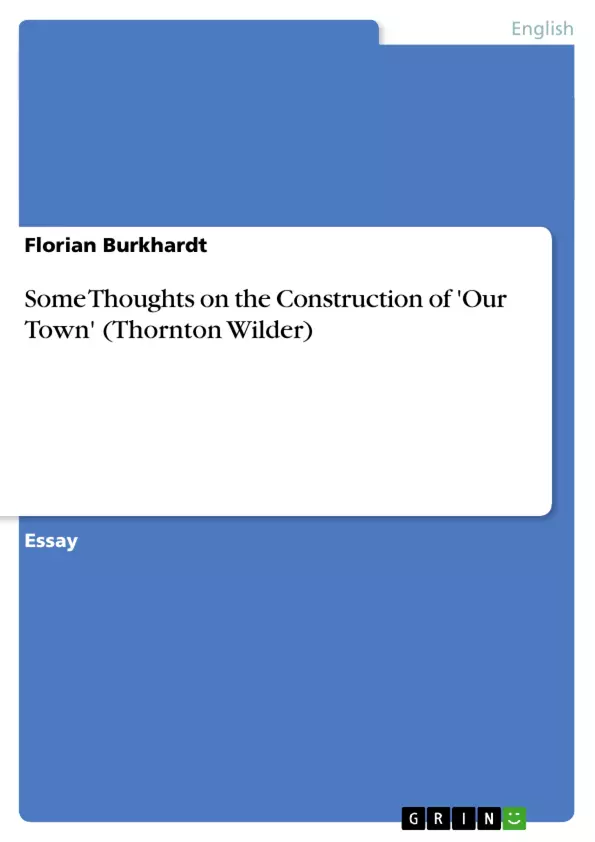Can you imagine Our Town as a play in the manner of the nineteenth century? Imagine an educated, interested audience watching the story of George Gibbs and Emily Webb. Threre is a stage in front of them decorated with the façade of two houses, two fences, some flowers, a painted butternut tree. There are two stoves inside the buildings, tables with tableclothes, some kitchen utensils, a hall-stand and so on.
The audience follows the story. They watch Dr. Gibbs chatting with Howie Newsome, the Webbs having breakfast. They see how George and Emily fall in love with one another in Morgan’s drugstore and then they marry. Emily dies and George mourns for his wife while she is talking to other deaths.
Of course this is a speculative question, but do you think people would enjoy that play? It would be rather boring, I think. “The play has no dramatic conflict, there is no significance within the plot. There is nothing special about George and Emily. The whole thing is ordinary and unimportant”, they would probably say – and they would be right.
So why did Our Town win the Pulitzer-Prize? Why was it called the American drama by some critics and why did it become so popular in postwar Germany?
Because it is not presented in the manner the nineteenth century. The construction of Our Town is totally different from what we call “fourth-wall stage”. The play is presented in a (at that time) new way: It is a narrative drama. As the form of such a drama gives new possibilities to potray a story, Our Town is far more than just its plot. The main emphasis of the meaning moves away from the plot towards the form.
The epic aspects of Our Town and its effects on the interpretation will be the topic of this essay.
Inhaltsverzeichnis (Table of Contents)
- The First Astonishing Thing
- The Stage Manager
- The Plot of Our Town
Zielsetzung und Themenschwerpunkte (Objectives and Key Themes)
The essay aims to analyze the construction of Thornton Wilder's play "Our Town" and its impact on the interpretation. It explores how the play's narrative structure, particularly the role of the stage manager, deviates from traditional dramatic conventions and contributes to the play's unique style and meaning.
- The unconventional scenery and its role in creating universality.
- The multiple functions of the stage manager as announcer, narrator, and actor.
- The allegorical nature of the play and its focus on the meaning behind the plot.
- The presentation of daily life and its universal significance.
- The play's exploration of love, marriage, and the end of life.
Zusammenfassung der Kapitel (Chapter Summaries)
- The First Astonishing Thing: This section discusses the unusual stage arrangement in "Our Town," where the scenery is minimal and mostly imagined. This unconventional setting disrupts the illusion of reality and encourages the audience to view the story as a broader allegory.
- The Stage Manager: This section examines the multifaceted role of the stage manager in "Our Town." He acts as an announcer, narrator, and actor, directly addressing the audience and guiding their understanding of the play's themes. His presence disrupts the traditional fourth-wall convention and emphasizes the play's constructed nature.
- The Plot of Our Town: This section analyzes the three acts of the play, exploring the themes of daily life, love and marriage, and the end of life. It argues that the seemingly ordinary plot serves as a vehicle for deeper meaning and universal significance.
Schlüsselwörter (Keywords)
The essay focuses on the following keywords and themes: narrative drama, fourth-wall stage, stage manager, allegory, daily life, love, marriage, death, universal significance, construction of meaning.
Frequently Asked Questions
Why is Thornton Wilder's 'Our Town' considered innovative?
It breaks traditional dramatic conventions by using minimal scenery and removing the "fourth wall," making it a narrative or epic drama rather than a realistic one.
What is the function of the Stage Manager in the play?
The Stage Manager acts as a narrator, announcer, and actor. He guides the audience, provides historical context, and disrupts the illusion of reality to emphasize the play's themes.
What are the main themes explored in 'Our Town'?
The play focuses on the beauty and significance of daily life, love and marriage, and the ultimate reality of death and the afterlife.
Why is there no elaborate scenery in 'Our Town'?
The minimal scenery encourages the audience to use their imagination and helps elevate the story of a small town to a universal allegory applicable to all people.
Is 'Our Town' an American drama?
Yes, many critics call it "the" American drama because of its portrayal of small-town values and its huge popularity, which led to it winning the Pulitzer Prize.
What does the term "narrative drama" mean in this context?
It refers to a play where the focus is shifted from a complex plot to the way the story is told, often involving a narrator who comments on the events.
- Citation du texte
- Florian Burkhardt (Auteur), 2004, Some Thoughts on the Construction of 'Our Town' (Thornton Wilder), Munich, GRIN Verlag, https://www.grin.com/document/46352



